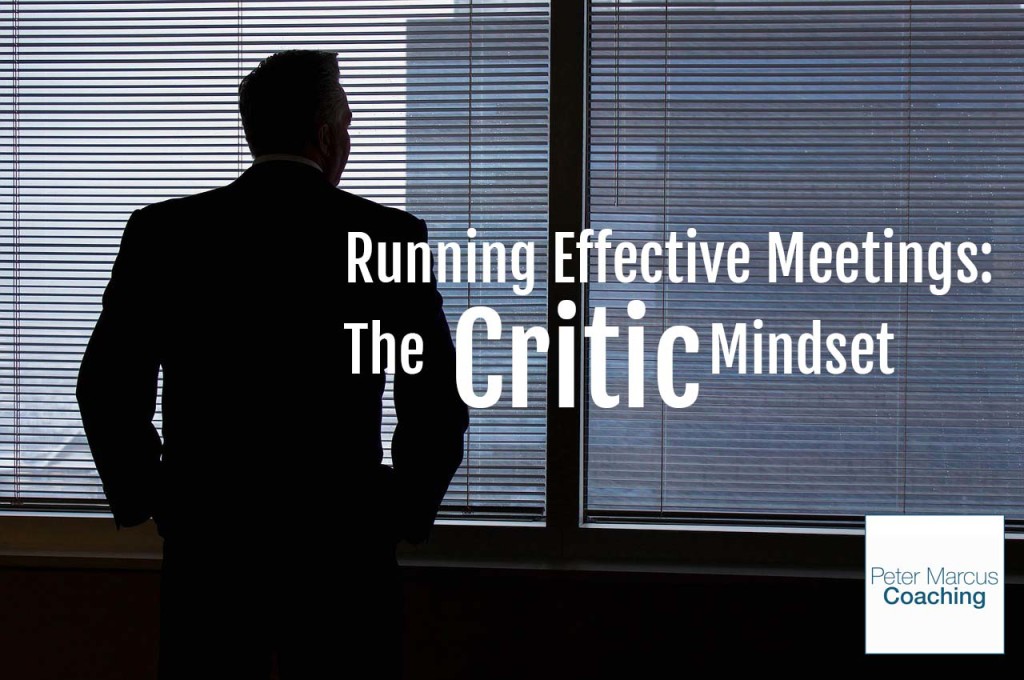Running Effective Meetings: The Critic Mindset

There are many moving parts that go into running an effective meeting. For everyone involved, it’s important that meetings achieve their intended purpose. There is a reason for calling that meeting, and that reason should be clear and actionable by the end of the time spent together.
The effectiveness of the meeting, though, depends on the mindsets of the participants sitting around the table. Participation and engagement are crucial to generating successful results and outcomes. However, participation is lost when not in the right mindset.
Let’s review the four types of potential meeting mindsets that can influence a business meeting:
- Prisoner. The Prisoner is forced to attend the meeting. They’d rather be dooing “real work” instead of sitting around a table wasting time.
- Vacationer. Like the Prisoner, the vacationer believes the meeting is a waste of time. However, they relish the thought of an hour away from the daily grind, and are likely to simply tune out.
- Critic. The Critic knows what the meeting is about and has already solved the dilemma. Their job is neither to learn nor dialogue, but to demonstrate their own superior knowledge.
- Developer. The Developer wants to so lve challenges. They see meetings as an opportunity to collaborate with others who may have expertise and knowledge beyond theirs in order to make good things happen.
Last week, we discussed the Vacationer mindset. The Vacationer feels that the meeting is a break from “real” work, rather than a productive opportunity. The Vacationer needs to switch from a viewpoint of hourly work to increments of work based on challenges and project outcomes.
Today we will take a look at the third type of mindset, the Critic.
The Critic mindset
Critics do not see value in attending the meeting because they feel they don’t stand to gain or learn anything from the gathering. They feel they already know what the meeting is about, they’ve already given their opinion on the matter, or they don’t like the subject at hand.
They may even feel they know better than the others at the table because they are smarter, wiser, and harder working than them. “I don’t like these people” becomes an unfortunate side effect to continued, unproductive meetings for the Critic.
This mindset is unproductive and hostile. It’s not a passive lack of contribution or participation like the Prisoner and Vacationer. The Critic actively tries not to contribute or, in worse cases, even tries to make the meeting go poorly to demonstrate their own correctness regarding the subject.
How to Move Past the Criticism
The Critic mindset damages not only the Critic but also the other meeting attendees. It reduces the productivity and effectiveness of a meeting by demoralizing the room one individual at a time.
Instead of being critical of those around you, revisit your career overall and what it means to your professional growth and development.
- Think about the purpose of your career. Why are you in this role? Why do you feel like meetings are not developing you or your position in this company?
- Realize that a team has many parts. You need others’ input and collaboration to be successful.
- Acknowledge and appreciate what your colleagues bring to the table. Even if you don’t agree with what they’re saying, it may spark innovation and inspiration. It can help you look at things in a new, fresh way and get you out of the stale Critic mindset.
Marcus Coaching’s BusinessLife skill: and Running effective meetings
Along with examining meeting mindsets in this month’s blog posts, we’re also exploring one of Marcus Coaching’s essential BusinessLife skills: running effective meetings. This BusinessLife skill can exponentially increase the value of your meetings by negating negative mindsets that hinder productive gatherings.
In the context of understanding the Prisoner, we discussed the principle:
“Understand the purpose for each meeting. Know you’re there for a reason.”
When bringing the Vacationer back from his trip, the principle was:
“Have the result clearly in mind.”
These are both relevant to the Critic’s mindset as well. As a Critic, you must understand the purpose of the meeting: you are there for a reason, and productive results should stem from that reason.
The Critic’s governing principle is:
“Choose to see meetings as a collaborative effort.”
How can you change the mindset from “I” to “we?”
- Enter the meeting with a strategically designed agenda.
- Iterate commonly understood goals and objectives.
- Understand an agreed-upon process for reaching those goals.
- Leave participants feeling that an efficient, necessary process has been followed and great results achieved.
Recognize your team’s purpose for the meeting. Understand that the only way to reach the desired outcomes is through collaboration. Work is about development — both personally and organizationally. Each meeting should be a time set aside for mutual growth for all participants.
Updating the first person viewpoint
If you find yourself in the Critic mindset, think about the purpose and goal of meetings. Choose to view them as something that you can both contribute to and receive from.
Even if at first you feel you are participating only for others’ benefit, soon you will get some benefit out of the meetings as well. Then, your Critic mindset will start to weaken.
Understanding the importance of working towards a common goal can help those objectives become tangible consequences of productive meetings.
Changing the Prisoner, Vacationer, and Critic to the Developer
Next time we will look at the fourth mindset, the Developer. This is the productive and creative person who actively chooses to contribute to the development of the project, their peers, and the business.

